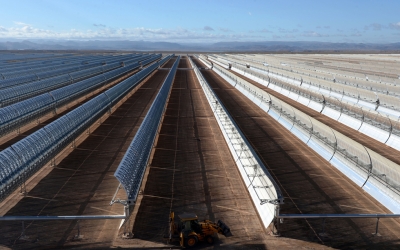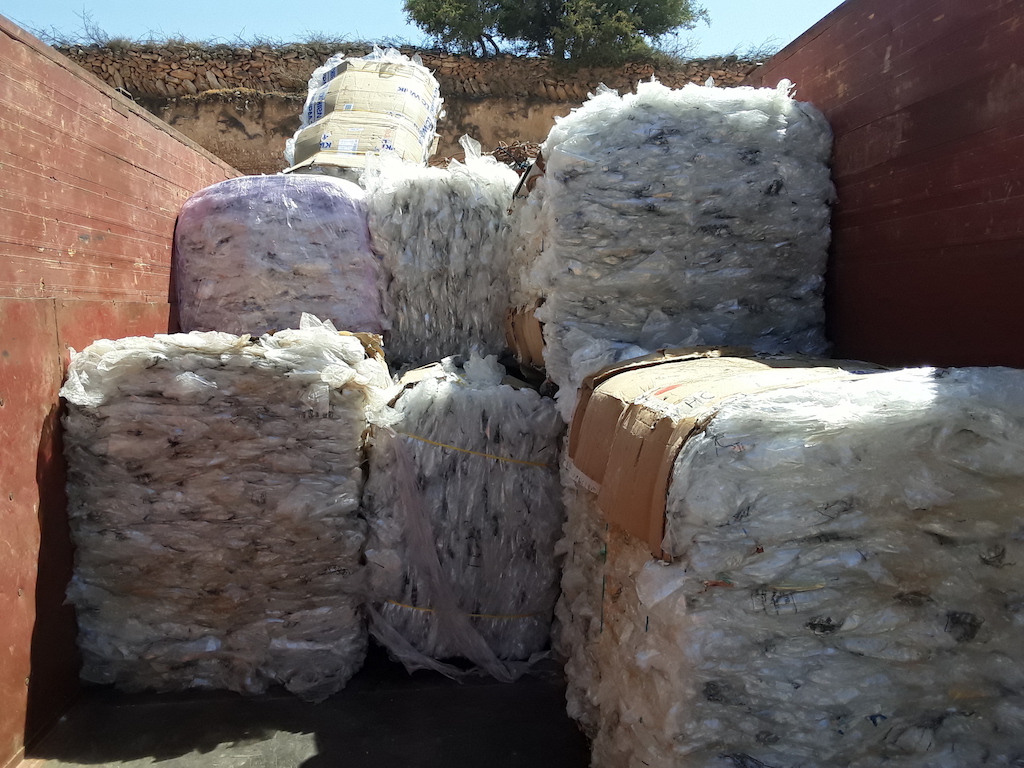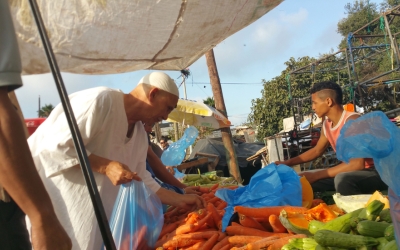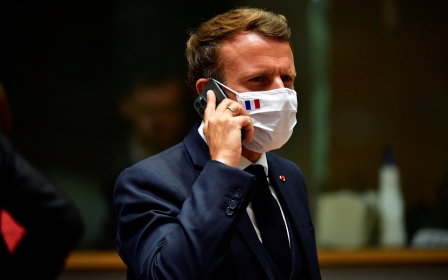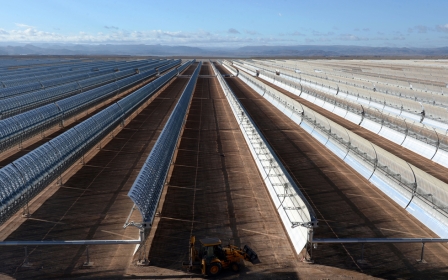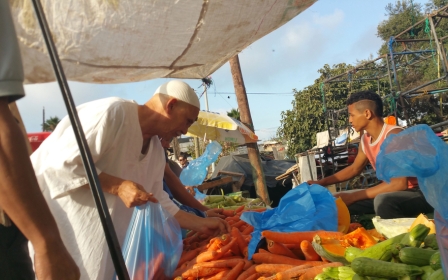Morocco's Essaouira aims to be the waste recycling pioneer of Africa
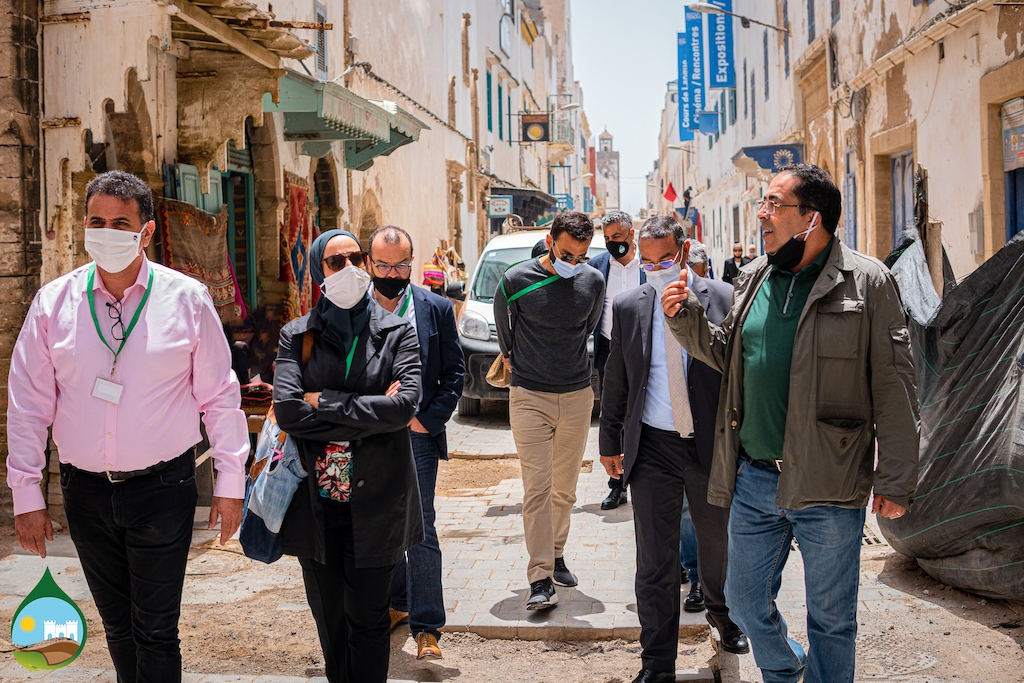
Will the Moroccan port city of Essaouira emerge as the selective waste-sorting champion of Africa? That's the goal promoters of the Mogagreen programme hope to achieve over the next 10 years.
At a meeting at the offices of the association Be Green, Mogagreen described its plans to lay the foundations for better recyclable waste management in Morocco, and perhaps even throughout the continent.
Mogagreen is just the start; it's a pilot scheme with scale-up potential.
"We believe that the waste management industry hasn't even got into gear yet. We want to use technology and digitalisation to create an alternative model with a potentially major impact on the circular economy and urban sustainability," Youssef Chaqor told Middle East Eye.
Chaqor is founder of Inveko-Environnement, one of the original companies behind the project and one already specialised in the valorisation of - or getting better value out of - used cooking oils.
New MEE newsletter: Jerusalem Dispatch
Sign up to get the latest insights and analysis on Israel-Palestine, alongside Turkey Unpacked and other MEE newsletters
Officially launched at the end of May and due to go live at the end of July, the project now has the support of various other private entities, and provincial and community stakeholders.
At present, the traditional model prevails: collection then burial in designated but overflowing landfill sites.
By bringing the entire sector into Mogagreen's reach and digitising the process, the project leaders hope to reduce the quantity of recyclable matter going to landfill, including the portion of recyclables that are irrecoverable due to soiling by organic waste in bins.
Awareness campaign to win support
The Moroccan association Zero Zbel, experts in the field, estimate the volume of this rubbish to be 18,000 tonnes per day.
'We want to create a real community and inspire it to build a sustainable project for the future'
- Youssef Chaqor, co-founder of Mogagreen
The first link in the chain: 20,000 households, 300 companies and 20 schools in Essaouira will be able to download an app or use WhatsApp to indicate their location to waste collectors or alternatively deliver their waste to designated drop-off points.
Mogagreen is counting on this multi-channel approach and on a major awareness-building campaign to win support.
"The awareness-building and educational campaigns account for 1.7 million dirhams [$190,000] out of a global budget of 5.5 million," said Marouane Malek, project manager at Inveko-Environnement.
Another driver is rewards. Users will be able to earn points based on the quantity of waste sorted, which they can convert into rewards such as phone top-ups.
The goal is to create a real community and to "make that community want to collaborate with us and build a sustainable project that will last well into the future," said Chaqor.
The second link in the chain is the rubbish collectors. The collecting and primary sorting process still falls to individuals in the informal sector: trash pickers, known as bouaara in the local Moroccan dialect.
The minister for the environment estimates their number at some 100,000 nationwide. According to Zbel, the actual figure is around three times greater.
On top of the 50 or so green jobs created, Mogagreen hopes to get local bouaara "on side" by granting them self-employed status, together with the associated benefits (health insurance, access to the banking and telephone systems, and so forth).
This aspect is particularly close to Tarek Ouamira's heart. Arriving in Morocco six years ago, this former senior transport and logistics technician chose the Atlantic coast "Windy City" of Essaouira to build up his own business of collecting and pre-sorting rubbish from restaurants and hotels. His very human, self-financed efforts served as something of a dry run for Mogagreen.
Ouamira currently collaborates with three collectors on a formal basis, on their own account. "These people are really committed. There's a profound desire, on the part of the collectors, to gain self-employed status," he told MEE.
"On the technical side, it's a bit more complex. Training is needed, for example, to learn the different categories of plastic. Essentially, for them, this work is about survival."
This future community of "happy collectors" wearing the Mogagreen colours will also have their own mobile app to allow them to organise and facilitate collections.
The third and final link is constituted by the companies or business groupings that, at the other end of the chain, are responsible for putting a financial or energy value on the waste.
"Our aim is to construct an extensive ecosystem. Parties may participate either as co-investors in the [secondary sorting] platform or recovering materials," said Chaqor.
At the outset, only plastic, cardboard, glass and frying fats will be valorised. Ultimately, textiles and old bread may be brought in to the process, along with other fermentable waste that can be made into biomass.
Drawing on collective intelligence
Besides the technological aspect, for the founders of Mogagreen, the method has its own inherent form of innovation: collective intelligence.
Preliminary discussions are already underway, as part of the Essaouira Territory Innovation Lab initiative, led by the association O'TED.
The Essaouiri "lab" has been operative since the end of 2018 and has inspired further labs to open in Sidi Ifni and Rahman, with Fes due to follow shortly.
Ouamira runs a small business in Essaouira collecting and pre-treating waste before sending it on through the various existing valorisation channels.
"The aim of these regional innovation laboratories is to harness collective intelligence in the service of the common good," said Zineb Belaabid, volunteer and founding member of O'TED.
"We help operators at district level (associations, public authorities, businesses, individuals, etc) to identify shared problematics and co-construct solutions. We serve as a catalyst."
In Essaouira, waste management, among other environmental matters, has rapidly garnered interest, attracting more than 70 volunteers, among them Ouamira and Chaqor.
A crucial connection is helping to drive Mogagreen's emergence. "The point of collective intelligence is that everyone sees what is happening and works together towards a better life," said Ouamira.
Also an integral part of the process, the local province has managed to locate synergies within its own regional project.
Essaouira Province Governor Adil El Maliki is keen to draw attention to a project for the installation of recycling bins that form part of rehabilitation plans for Essaouira's ancient medina and the creation of an ecovillage at Sidi Kaouki.
"Mogagreen has every chance and opportunity to succeed, and for its success to be shared and replicated in other regions throughout the kingdom," he said at the official launch.
Even with so much goodwill and potential behind it, the challenge Mogagreen faces is no small one.
First of all, the financing needs to be finalised, which will depend principally on the participation of the major food industry brands as well as on a national strategy already falling short on expectations.
Morocco produces an annual 6.9 million tonnes of waste. Although the National Plan for Household Waste Management (PND) is scheduled to recycle 20% of it by 2022, last year it only achieved a figure of 7 percent. Plastics recycling amounted to 11 percent with the remainder often ending up in the countryside.
The trick will be to keep all stakeholders on board and committed to building an effective and sustainable model.
This article is available in French on Middle East Eye French edition.
Middle East Eye delivers independent and unrivalled coverage and analysis of the Middle East, North Africa and beyond. To learn more about republishing this content and the associated fees, please fill out this form. More about MEE can be found here.


